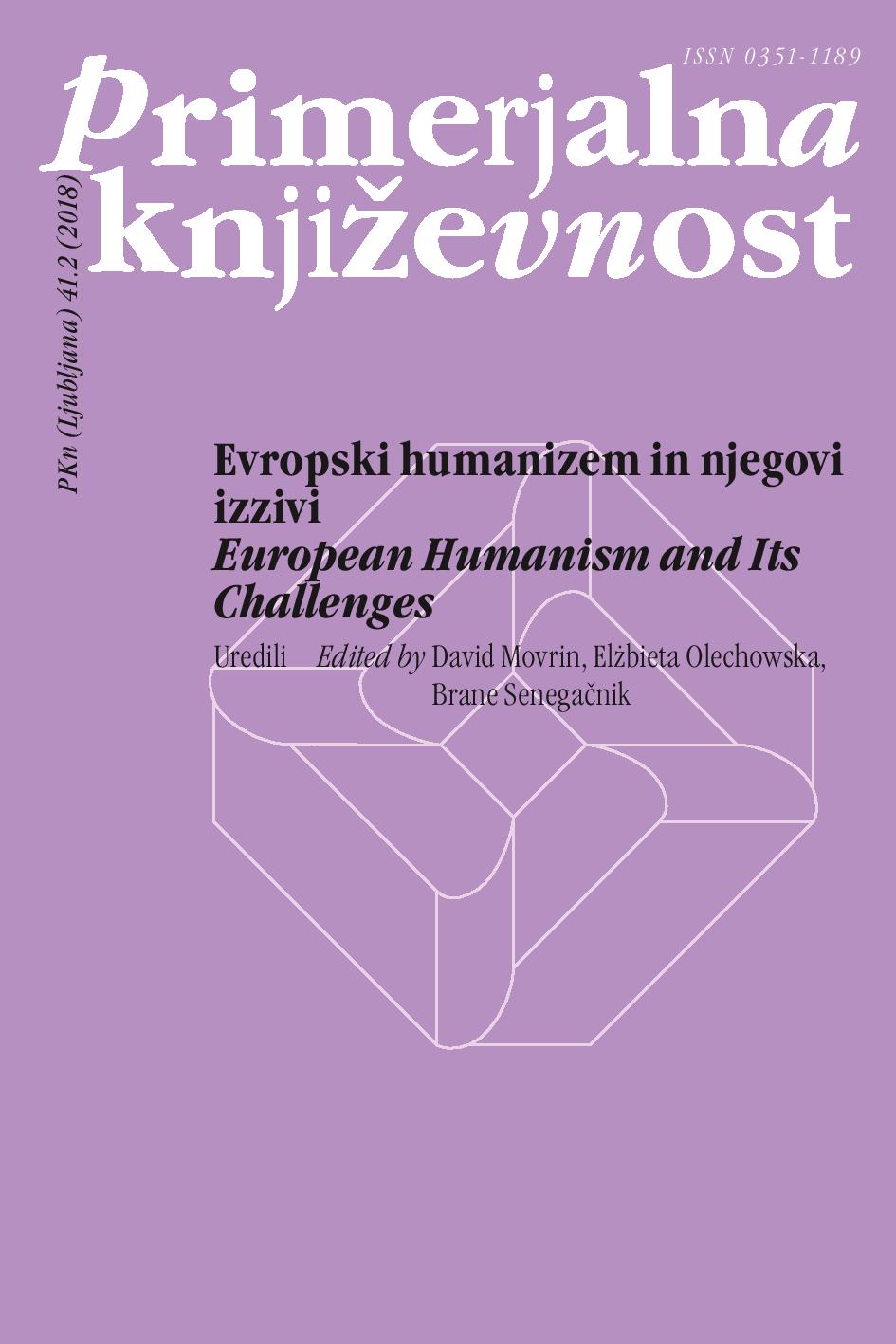The “Challenges of Humanism” in Roman Historical Poetry
Keywords:
Latin poetry, historical epic, intertextuality, metapoetic realism, Cicero, Lucan, Silius ItalicusAbstract
Augustan poetry is perhaps the most classic of all European classics. Its literary vision of gradual advance (back) to Golden-Age peace and prosperity has taken center stage in the process of defining European humanism. Post-Augustan epic poets like Lucan, however, also seem to doubt whether humanity can be taught by letters. This has often been interpreted as anti-classicist and, hence, antihumanistic. However, can the ideals of civilizing literature, in fact, be proven wrong? Is there no other way to deal with the challenges of humanism than to give in? A promising interpretive approach to this question is studying the specific metapoetic potential of historical poetry. Literary characters of such poems can “realistically” appear as readers; often, their success or failure may be directly related to the literary education they show. This opens up a space for a particular kind of intertextuality. In acutely reflecting the impact of their reference texts, historical epic poems have made a distinctive contribution to the classification of the classics, i.e., the defense of humanity.References
Ambühl, Annemarie. Krieg und Bürgerkrieg bei Lucan und in der griechischen Literatur: Studien zur Rezeption der attischen Tragödie und der hellenistischen Dichtung im Bellum civile. Berlin: De Gruyter, 2015.
Behrendt, Anja. Mit Zitaten kommunizieren: Untersuchungen zur Zitierweise in der Korrespondenz des Marcus Tullius Cicero. Rahden: Verlag Marie Leidorf, 2013.
Braund, Susan. Lucan, Civil War: Translation with Introduction and Notes. Oxford: Clarendon Press, 1992.
Bureau, Bruno. “Lucain, l’histoire et la mémoire poétique.” Lucain en débat : rhétorique, poétique et histoire. Actes du Colloque international, Institut Ausonius (Pessac, 12–14 juin 2008). Eds. Olivier Devillers and Sylvie Franchet d’Esperey. Paris: Diffusion de Boccard, 2010. 77–87.
Conte, Gian Biagio. The Poetry of Pathos: Studies in Virgilian Epic. Oxford: Oxford University Press, 2007.
Due, Otto S. “Lucain et la philosophie.” Lucain. Ed. Marcel Durry. Geneve: Fondation Hardt, 1970. 201–224.
Ehrenfeld, David. The Arrogance of Humanism. Oxford: Oxford University Press, 1978.
Eigler, Ulrich. “Caesar in Troja: Lucan und der lange Schatten Vergils.” Lucan im 21. Jahrhundert. Ed. Christine Walde. Munich: Saur, 2005. 186–201.
Genette, Gérard. Métalepse : de la figure à la fiction. Paris: Editions du Seuil, 2004.
Groß, Daniel. Plenus litteris Lucanus: Zur Rezeption der horazischen Oden und Epoden in Lucans Bellum civile. Rahden: Verlag Marie Leidorf, 2013.
Hardie, Philip R. “Ovid’s Theban History: The First Anti-Aeneid?” CQ 40 (1990): 224–235.
Häußler, Reinhard. Das historische Epos der Griechen und Römer bis Vergil. Heidelberg: Winter, 1976.
– – –. Das historische Epos von Lucan bis Silius und seine Theorie. Heidelberg: Winter, 1978.
Høgel, Christian. The Human and the Humane: Humanity as Argument from Cicero to Erasmus. Göttingen: Vandenhoeck & Ruprecht, 2015.
Johnson, Walter Ralph. Momentary Monsters, Lucan and His Heroes. Ithaka: Cornell University Press, 1987.
Haecker, Theodor. Virgil, Vater des Abendlandes. Munich: Kosel, 1931.
Hunt, Harold Arthur Kinross. The Humanism of Cicero. Melbourne: Melbourne University Press, 1954.
Kersten, Markus. “Über Lucan, Vergil, Naivität und Sentiment: Anmerkungen zum ‘Anti-Vergil’.” GFA 18 (2015): 239–256.
– – –. “Literaturgeschichte im historischen Epos: Anachronismen, Realismus und Metapoetik.” Zeitmontagen: Formen und Funktionen gezielter Anachronismen. Eds. Dennis Pausch and Antje Junghans. Stuttgart: Steiner (forthcoming).
Klingner, Friedrich. “Humanität und Humanitas.” Römische Geisteswelt. Ed. Friedrich Klingner. Munich: Ellermann, 1965. 704–746.
Korenjak, Martin. “Briefe eines Philosophen? Horaz im ersten Epistelbuch.” WS 129 (2016): 281–297.
Kurczyk, Stephanie. Cicero und die Inszenierung der eigenen Vergangenheit: autobiographisches Schreiben in der späten Römischen Republik. Köln: Böhlau, 2006.
Marinčič, Marko. “Der Weltaltermythos in Catulls Peleus-Epos (c. 64), der Kleine Herakles (Theokr. id. 24) und der römische ‘Messianismus’ Vergils.” Hermes 129 (2001): 484–504.
Marks, Raymond. From Republic to Empire: Scipio Africanus in the Punica of Silius Italicus. Frankfurt: Peter Lang, 2005.
Masters, Jamie. Poetry and Civil War in Lucan’s Bellum civile. Cambridge: Cambridge University Press, 1992.
Mayer, Roland. “Horace’s Epistles 1 and Philosophy.” The American Journal of Philology 107 (1986): 55–73.
Nagy, Gregory. Homer the Classic. Cambridge, MA: Harvard University Press, 2009.
Nauta, Ruurd. “Metalepsis and Metapoetics in Latin Poetry.” Über die Grenze: Metalepse in Text- und Bildmedien des Altertums. Eds. Ute E. Eisen and Peter von Mollendorff. Berlin: De Gruyter, 2013. 223–256.
Ormand, Kirk. “Lucan’s Auctor Vix Fidelis.” ClAnt 13 (1994): 38–55.
Reitz, Christiane. Die Nekyia in den Punica des Silius Italicus. Frankfurt: Peter Lang, 1982.
Rossi, Andreola. “Remapping the Past: Caesar’s Tale of Troy (Lucan BC 9.964–999).” Phoenix 55 (2001): 313–326.
Skalitzky, Rachel I. “Good Wine in a New Vase (Horace, Epistles 1.2).” TAPA 99 (1968): 443–452.
Spahlinger, Lothar. Tulliana simplicitas: Zu Form und Funktion des Zitats in den philosophischen Dialogen Ciceros. Göttingen: Vandenhoeck & Ruprecht, 2005.
Tesoriero, Charles. “Trampling over Troy: Caesar, Virgil, Lucan.” Lucan im 21. Jahrhundert. Ed. Christine Walde. Munich: Saur, 2005. 202–215.
Tipping, Ben. “Virtue and Narrative in Silius Italicus’ Punica.” Brill’s Companion to Silius Italicus. Ed. Antony Augoustakis. Leiden: Brill, 2009. 193–218.
Volk, Katharina. “The Genre of Cicero’s De consulato suo.” Generic Interfaces in Latin Literature: Encounters, Interactions and Transformations. Ed. Theodore D. Papanghelis. Berlin: De Gruyter, 2013. 93–112.
Ziolkowski, Jan, and Richard Thomas (eds.). The Virgil Encyclopedia. Malden, MA: Wiley-Blackwell, 2014.


